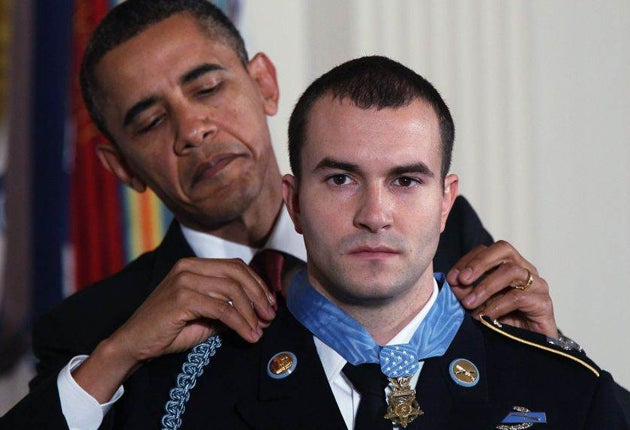Afghan and Iraq veteran makes history with Medal of Honor

The United States's highest military honour was for the first time awarded to a living veteran of the Iraq and Afghanistan wars yesterday.
US Army Staff Sergeant Salvatore Giunta, also the first living recipient since the Vietnam War, was given the Medal of Honor by President Barack Obama during a ceremony at the White House. Sgt Giunta was decorated for his heroism during an ambush in Afghanistan's Korengal Valley, a key insurgent supply route from Pakistan. He braved heavy gunfire to pull a fellow soldier to cover and rescued another being dragged away by insurgents.
Sgt Giunta, who completed two combat tours in Afghanistan totalling 27 months, was a serving as a rifle-team leader on 25 October 2007 when his squad was ambushed under a full moon, by a well-armed, well co-ordinated insurgent force. The two lead men in his squad were hit by enemy fire. A third was struck in the helmet and fell to the ground. "Sal charged headlong into the wall of bullets to pull him to safety behind what little cover there was," Mr Obama said. "As he did, Sal was hit twice, one round slamming into his body armour, the other shattering a weapon slung across his back. They were pinned down...
" Repeatedly and without hesitation, you charged forward through extreme enemy fire, embodying the warrior ethos that says: 'I will never leave a fallen comrade,'" Mr Obama added. "Your actions disrupted a devastating ambush before it could claim more lives. Your courage prevented the capture of an American soldier and brought that soldier back to his family."
While yesterday's ceremony highlighted personal valour in the line of fire, it also cast a brief spotlight on a significant setback of the war, now in its tenth year, at a time when the US is eager to show progress.
Seven months ago, the US withdrew from Korengal, which had become a symbol of the brutality and frustrations of the Afghan war, deciding that the isolated valley wasn't worth the sacrifice – 42 US troops had died there.
It was in many ways a symbol of the limits of American power in Afghanistan and of the evolving strategy there. US troops pulled out of it and other remote, thinly populated areas in April when commanders decided it was better to use forces to protect civilian population centres.
That strategy seemed more viable than keeping troops in scattered isolated outposts where troops were highly exposed to attacks from Taliban, al-Qa'ida and other foreign fighters.
Subscribe to Independent Premium to bookmark this article
Want to bookmark your favourite articles and stories to read or reference later? Start your Independent Premium subscription today.

Join our commenting forum
Join thought-provoking conversations, follow other Independent readers and see their replies